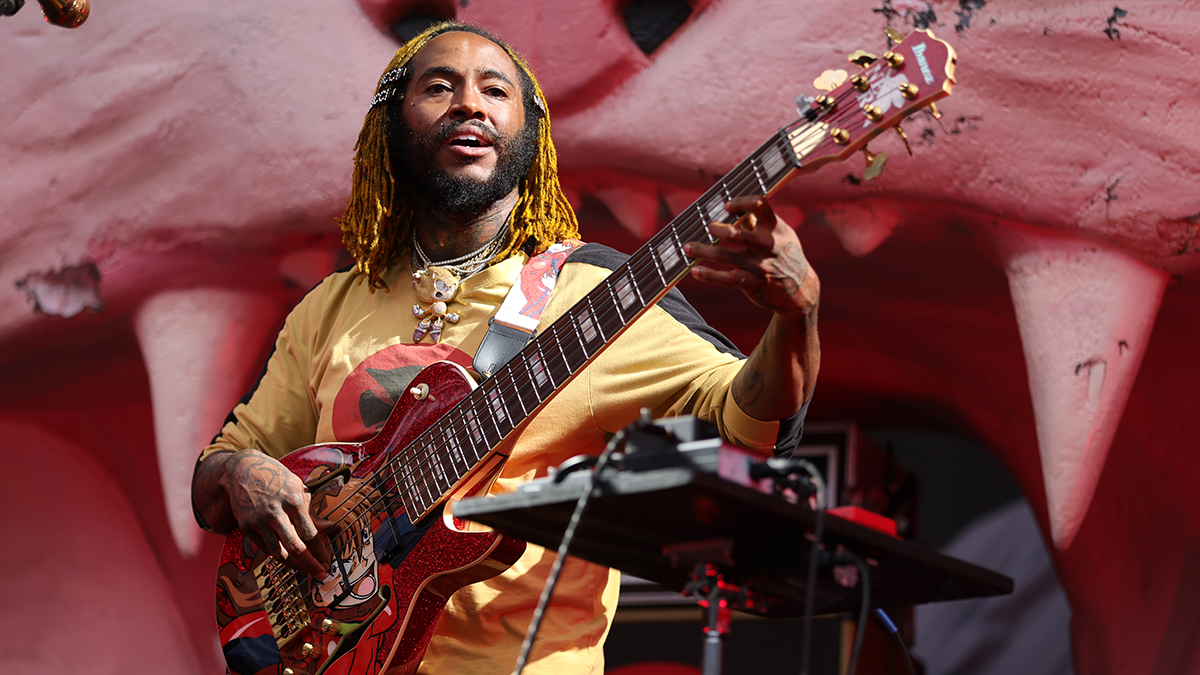“Young bass players should diversify their sound if they want to land gigs. Not everyone can be in Foo Fighters”: How Juan Alderete’s infatuation with bass gear made him one of the world’s greatest authorities on pedals and effects
The Mars Volta and Racer X tone wizard imparts decades of wisdom on stompboxes and all things bass effects
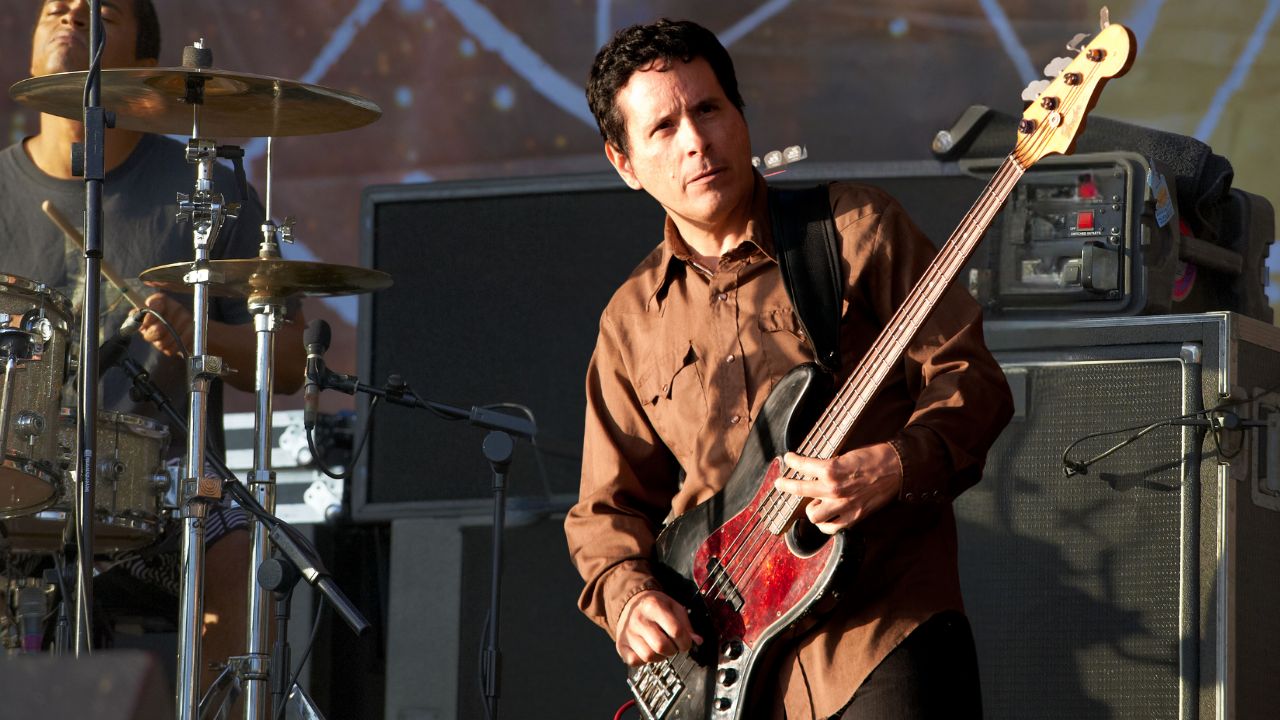
All the latest guitar news, interviews, lessons, reviews, deals and more, direct to your inbox!
You are now subscribed
Your newsletter sign-up was successful
Juan Alderete's infatuation with bass gear has led him to become one of the world's great authorities on pedals and effects, granting him sommelier status that has fuelled his popular website pedalsandeffects.com, and his crusades through small-town pawnshops to find hidden bass gems.
“Once you get into effects, you're not just running a bass guitar anymore – it's an entirely different animal,” Alderete told Bass Player back in 2017. “Nowadays, it's important for young bass players to diversify their sound. Pedals are an important part of landing gigs. Not everyone can be in Foo Fighters.”
Fortunately, Alderete's bass gear has always been put to good use. Best known for his stellar work with bands like Racer X, Distortion Felix, Big Sir, Vato Negro, and the Mars Volta, the 62-year-old Los Angeles native has also laid down grooves for hip-hop heavyweights Deltron 3030 and Dr. Octagon.
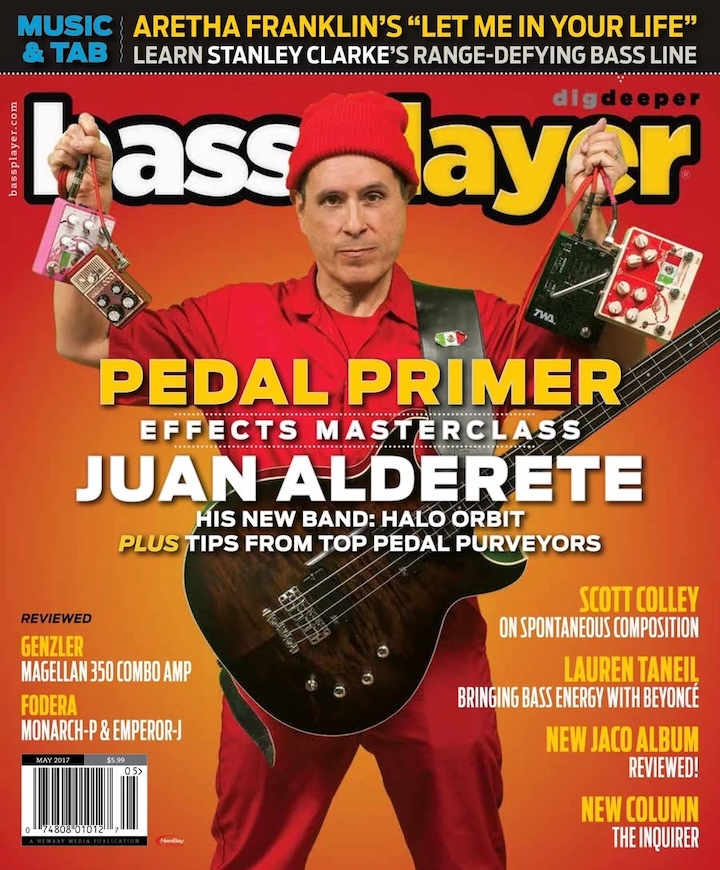
“I think it's important to try new things, get new sounds, and not be afraid to experiment. I can play straight, standard bass, but I'm trying to push our instrument somewhere – because if not, it dies. I'm trying to transform the instrument and push it into the future so we're not left behind.”
With Halo Orbit, his 2017 collaboration with drum phenom Mark Guiliana and Japanese guitar virtuoso suGar, Alderete harnessed a barrage of sounds that are wildly distorted on Subump and Angels Flight, rubbery and elastic on Love or Lost, and sand-paper-gritty on the title track.
Regardless of the project, the band members, or the genre, though, he is always pushing the boundaries of effects on the bass guitar. Juan Alderete might indeed have a problem, but fortunately for us, it's a good problem to have.
What was the evolution of your pedal obsession?
All the latest guitar news, interviews, lessons, reviews, deals and more, direct to your inbox!
In Racer X, we focused on shredding, and I got the tone I needed by using a Boss CS-2 compression pedal and my Jazz Bass. But in the '80s, everyone was using a chorus pedal, so I got a TC Electronic Stereo Chorus Flanger. Then I bought a Boss OC-2 because my bass teacher, Steve Evans, used one while he soloed.
In the '90s, I started getting into Electro-Harmonix Micro Synths. I wasn't the first to do it – Michael Anthony of Van Halen would use the Up Bass feature on a Micro Synth when he soloed. Then I got a fuzz pedal, and before I knew it, I was getting into all sorts of distortion, which got me into researching pedals and buying and selling them left and right.
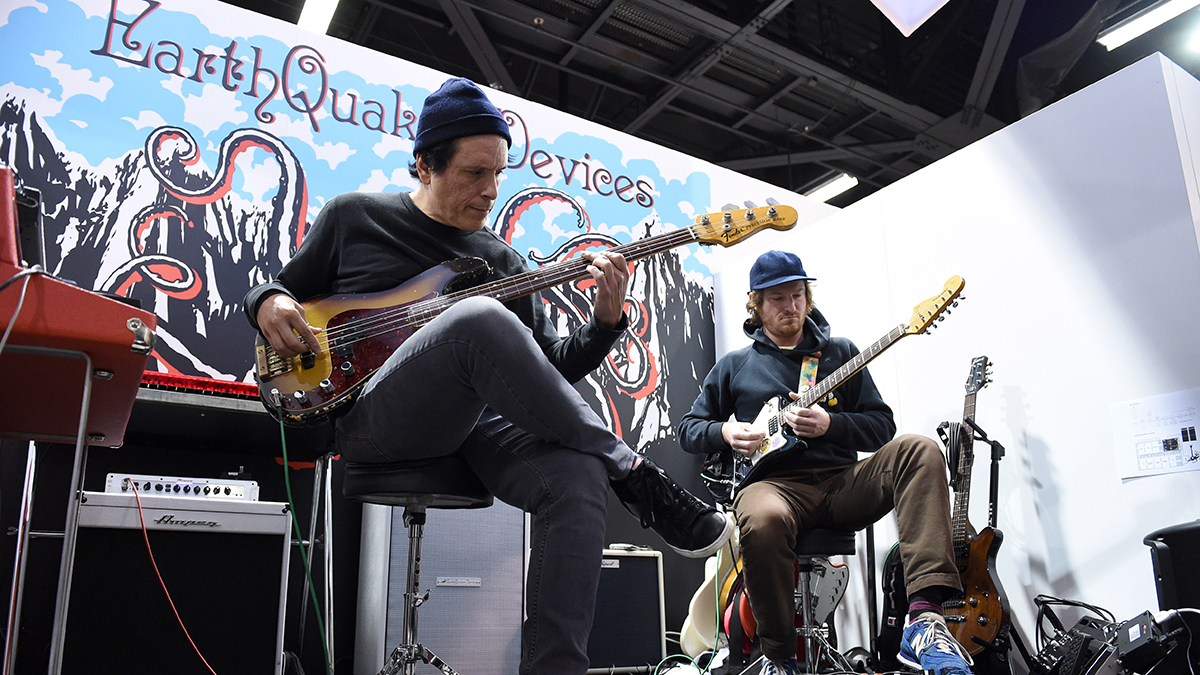
How many effects were you using with the Mars Volta?
My pedalboard kept getting bigger and bigger until I had four massive pedalboards on tour. My setup got so huge that it weighed more than anybody else's stuff on stage. Then I built a studio in 2011 for my effects collection, which is 400 to 500 pedals.
Which ones end up on your board these days?
My old joke is that I put Mexican flag stickers on pedals that make the cut. As for the most indispensable ones, I'd say the Boss CS-2, OC-2, and VB-2 pedals; my vintage Micro Synth; the EarthQuaker Devices Hummingbird, Afterneath, Hoof Reaper, and Rainbow Machine; Red Panda's Context Reverb, Godlyke's Great Divide, the Chase Bliss Audio Warped Vinyl, the Dunlop Cry Baby Mini Bass Wah ... man, I could go on and on.
Which players inspired your penchant for effects?
I remember seeing Tim Bogert at Musicians Institute in the '80s, and his Boss pedalboard had a bunch of effects on it. He was going crazy with them, and I didn't get it. I wasn't ready for it yet, but I look back on that as a big moment.
A lot of guitar players, like Eddie Van Halen and the Edge, influenced me heavily, too. The Edge is the greatest pedal user of all time. He's always gotten such insane sounds, and he changed the whole landscape of using pedals.
Which current pedal users rock your world?
I've been digging the pioneering stuff Tim Lefebvre did on David Bowie's Blackstar album. There are a ton of players in the fusion world who are killing it with effects, though it can be hard for me to digest that music. I love Timmy's pedal use with Rage Against the Machine. His bass work on Bulls on Parade with the distortion is huge, and I like what he does with a wah.
Are there any pedals that you've always wanted but haven't been able to get?
I'd really love to get the rackmount version of the Micro Synth, but they only made 10 of those, and they're really hard to find. I just got my hands on this '60s Vox Ampliphonic Stereo Multi-Voice synth that I had been seeking forever. Kid Koala, who'd been telling me about his for a while, found one in a music shop in Seattle, and I bought it over the phone.
How do you get to know a new pedal?
I play multiple basses through it to see how it reacts. I might feed in some guitars, keyboards, and drum machines to see how it responds; that usually helps me figure out how to use it with bass.
I test all its settings, explore its range, figure out how I could use it, and then see how it pairs with my other pedals so I can know whether I'll want to run it exclusively with a fuzz, a compressor, or anything else. Really, it's all about exploring it from top to bottom.
If a bass player could only own three types of effects, what should they be?
An octave or a sub, a synth pedal, and a fuzz pedal. The octave and synth are important because we live in the low-end, and those really boost that. And the fuzz is just necessary. If I could pick a fourth type, I'd throw a modulation (chorus or flanger) in there, too.
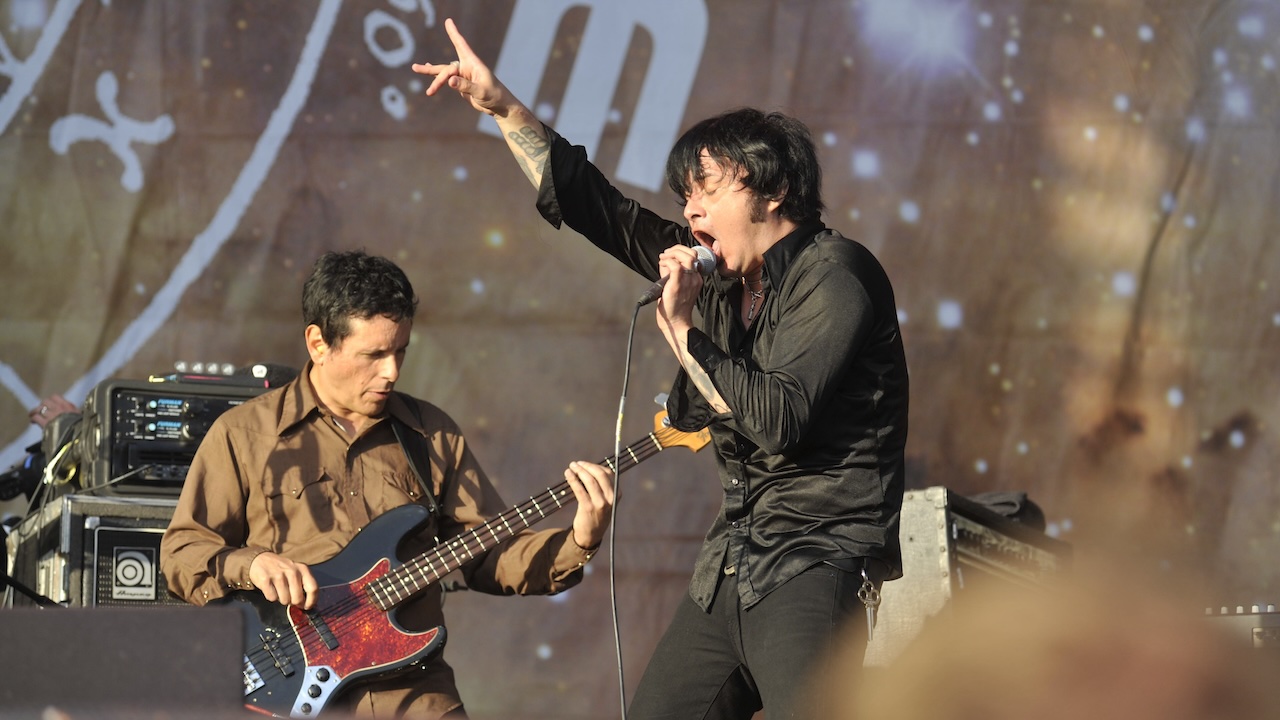
What's a powerful fuzz or distortion pedal for players who aren't into the Big Muff?
I always suggest the Earthquaker Devices Hoof Reaper. It's two fuzzes in one, and then some. You get the Hoof and the Tone Reaper distortion options, and you also get the octave up; you can use both fuzzes at the same time, or the distortions and the octave, all at once.
I also like the Dwarfcraft Eau Claire Thunder, which was my main distortion in Mars Volta. The Amptweaker TightFuzz is really heavy without being overly noisy. There are so many options for distortion and fuzz pedals.
How did Halo Orbit come together?
I met suGar in the '90s when her band Buffalo Daughter and my band Distortion Felix were opening for Girls Against Boys. Her playing immediately blew me away; she's a complete anomaly on the guitar. We became close friends, and over the years, we talked about doing a project together.
When I was in New York with Mars Volta in 2010, one of my drummer buddies told me I had to meet Mark Guiliana, so I put him on the guestlist and we hung out. He was such a good dude. Without even hearing him play, I told him we should collaborate, and he was all for it.
In 2012, they flew to L.A., jammed, and cut six ideas in the studio. We did it all in six hours, Mark flew home, and suGar and I wrote the rest of the material. They both flew back out to L.A. again to cut the remaining tracks.
You get a huge, distorted sound on the opening track Subump. How did you get that tone?
It's all the Hoof Reaper. It has the octave up option on top of its fuzz function, which is just massive. New pedals usually inspire me to write a bunch of compositions around that sound. I wrote that main guitar riff and the bass part that comes in, suGar overdubbed the wah guitar parts. and Mark came in and nailed that song in one take.
How can a bass player incorporate effects into their live rig without compromising supportive low-frequency response?
You can run two rigs, one that's clean and one that runs all the effects, so you get both at the same time. I did that with Halo Orbit, but I used effects on both channels. There are ways that pedals can work for your sound and maintain the thickness you want.
What would you tell a bass player interested in building a pedal collection?
Depending on what kind of music you're playing, get a good-sounding distortion, fuzz, or overdrive. Next, get a compressor. A good chorus always helps; I like analog choruses, myself. Delays are weird for bass, because you're the timekeeper, so unless you use it right, you might have issues; be cautious with those. And any wah is good, because, well, Cliff Burton.
You must confirm your public display name before commenting
Please logout and then login again, you will then be prompted to enter your display name.





